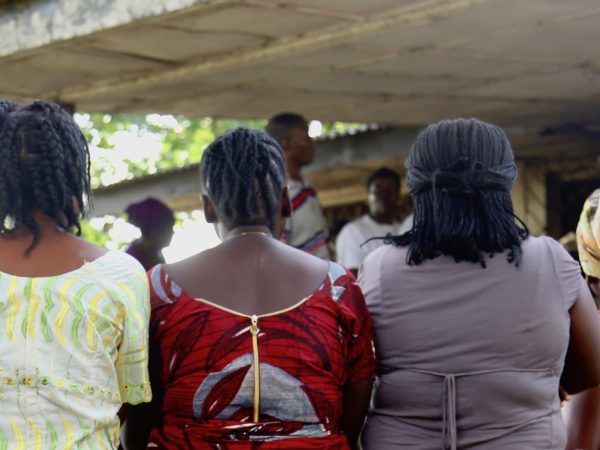United States: U.S. International Development Finance Corporation (DFC) | Office of Accountability (OA)
-
Overview
The U.S. International Development Finance Corporation (DFC) is a U.S. government agency that supports the private sector for development projects around the world. The DFC became operational in January 2020 and subsumes the former U.S. government development finance institution, the Overseas Private Investment Corporation (OPIC), and USAID’s Development Credit Authority (DCA). The DFC supports businesses by providing investors with debt financing, equity financing, political risk insurance, and technical development.
U.S. International Development Finance Corporation (DFC)
Created In: 2018 (Operational in 2020)
Headquarters: Washington, D.C., United States
Mission: DFC is America’s development bank. DFC partners with the private sector to finance solutions to the most critical challenges facing the developing world today.
The Accountability Office: Office of Accountability (OA)
Established in: 2018 (Operational in 2020; OPIC’s OA established in 2005)
Functions: Compliance Review, Dispute Resolution
The Better Utilization of Investments Leading to Development (BUILD) Act, the legislation that created the DFC, mandates that OPIC’s policies, including its environmental and social policies, carry over to the new institution. The DFC’s environmental, social, and labor policies and procedures are described in the DFC’s Environmental and Social Policy and Procedures. The DFC must also comply with OPIC’s environmental handbook.
As a federal agency, the DFC must follow the Freedom of Information Act (FOIA). FOIA, found in Section 552 of Title 5 of the United States Code, was enacted by Congress to provide the public with access to certain federal records. The act requires federal agencies to produce government records in response to requests from the public, provided that the records are not exempt from disclosure by FOIA.
The Accountability Office
The Office of Accountability (OA) is an independent office within DFC that addresses concerns, complaints, or conflicts about environmental or social issues that may arise around DFC-supported projects. The office provides project-affected communities, project sponsors, and project workers an opportunity to have concerns independently reviewed and addressed.
The full set of policies for the DFC’s Office of Accountability are still in development. For more information on how to submit a complaint now, please visit the OA’s website.
-
Our Advocacy
Ensuring a Strong Accountability Framework for the DFC
The DFC became operational on January 2, 2020. As the agency increases its operations, it is crucial that the DFC has a strong accountability framework to address any unintended impacts to communities from its financing.
As a result of our advocacy, the BUILD Act that created the DFC mandated an accountability office for the agency. In September 2020, the DFC Board approved the resolution outlining the foundational principles for the office and includes some changes from OPIC’s accountability office that will serve to improve the accessibility and fairness of the process.
To ensure that the principles underpinning the accountability office in the resolution – including impartiality, accessibility, and transparency – are effectively implemented, the office must have strong Terms of Reference (TOR) or procedures. The resolution commits to a public consultation on the TOR two years after they are approved by the Board. However, we are advocating for the initial TOR to be subject to a public consultation process before they are approved by the Board to ensure that they reflect international best practices and are shaped by the stakeholders that could potentially use the mechanism.
The accountability office should also have strong leadership. Following best practice at other development finance institutions, we are advocating that external stakeholders, especially civil society organizations, be involved in the selection process of the office’s director.
Advocating for Strong Environmental and Human Rights Safeguards
In 2023, the DFC launched a review of its Environmental and Social Policy and Procedures (ESPP). The ESPP is DFC’s main safeguards document that includes environmental, human rights, and labor requirements for DFC projects. Given the importance of preventing harm to people and the environment, it is important for the revised ESPP to be as robust as possible.
In April 2023, Accountability Counsel and 12 partners submitted comments on the draft ESPP. While the draft ESPP includes some improvements from the current version, including increased references to the heightened social risk vulnerable groups face, there are still several areas where the ESPP needs stronger requirements, including:
- Scope: The draft ESPP states that it does not apply to the DFC’s technical assistance activities. Technical assistance activities lead to the design and implementation of projects and can cause harm to project-affected communities. Several complaints have been filed to development finance institutions’ (DFIs’) accountability mechanisms concerning the environmental and social impacts of technical assistance projects. To prevent harm, the ESPP should apply to all of the DFC’s activities, including technical assistance.
- Inconsistency with MDB Policies: The DFC should meet and exceed the highest industry standards and at least what the U.S. requires of the multilateral development banks (MDBs) in which it is a member. As one of the largest shareholders of the MDBs and historically the most vocal advocate for high environmental, social, and accountability standards at the institutions, the U.S. can demonstrate its commitment to sustainable and inclusive development by holding its own DFI to the same standards it calls on the MDBs to meet. The DFC should address inconsistencies within the ESPP.
- Remedy: When projects harm communities, these harms must be fully remediated. Unfortunately, the DFC’s predecessor, the Overseas Private Investment Corporation, had a poor track record in this area. The DFC should develop, through public consultation, a separate policy on remedy that:
- Develops processes to facilitate and provide remedy in consultation with project-affected stakeholders.
- Includes options for remedy from the earliest stages of project negotiation and design, creates provisions in case of harm in contractual agreements with borrowers and clients, and establishes a framework for DFC to contribute to remedy.
- Accounts for how the DFC and its clients will remediate harm when the client or the DFC exits a project investment.
The final ESPP is expected in late 2023.
Click here for past policy advocacy related to the DFC and Overseas Private Investment Corporation.
-
Past Advocacy
Past Initiatives
- 2020 Pushing for Better Development Impact Assessment and Increased Transparency and Stakeholder Engagement
- 2018 Advocating for a Sound Foundation for a New U.S. Development Finance Institution
- 2018 Strengthening OPIC’s Project and Client Application Process
- 2015 – 2017 OPIC Environmental and Social Policy Statement Review
- 2014 – 2016 Feeding our Casework in Liberia into OPIC Policy Change
- 2013 – 2014 OPIC OA Policy Review
- 2012 – 2013 OPIC OA Policy Review Campaign
- 2010 Reviews of OPIC’s Environmental and Social Policy
-
Documents
DFC
Institutional Documents
Board Resolution for the DFC’s Independent Accountability Mechanism
Federal Aviation Administration Reauthorization Act of 2018
Documents by Release Date
April 2023 – AC and 12 CSO partners submitted comments on the DFC’s draft revised Environmental and Social Policy and Procedures.
June 2021 – Accountability Counsel submitted written testimony to the Senate Appropriations Committee’s subcommittee on State, Foreign Operations, and Related Programs with recommendations to strengthen accountability at the DFC.
November 2020 – Recommendations from AC, IAP, and 25 partners on the DFC’s draft Transparency and Board Public Engagement policies.
July 2020 – AC and 26 CSOs submitted recommendations for the DFC’s Impact Quotient system for measuring development impact
Mar 2019 – Accountability Counsel and over 30 partners sent a joint letter to the Senate Foreign Relations Committee and the House Foreign Affairs Committee requesting a hearing and robust oversight of the transition of OPIC and USAID’s DCA to the DFC. Accountability Counsel’s recommendations for the next steps for the DFC can be found here, and our specific recommendations for the DFC’s independent accountability office can be found here.
Oct 2018 – The U.S. Senate passed the Federal Aviation Administration Reauthorization Act of 2018, which includes the Better Utilization of Investments Leading to Development Act (BUILD Act). As a result of Accountability Counsel and our partners’ advocacy, the final legislation includes strengthened environmental and social provisions and mandates an independent accountability office to receive complaints of harm related to the DFC’s activities.
Mar 2018 – The Better Utilization of Investments Leading to Development (BUILD) Act was introduced in both the House and Senate. The bi-partisan bills called for the creation of a new U.S. development finance institution, the United States International Development Finance Corporation (DFC).
OPIC
Institutional Documents
Environmental and Social Policy Statement
Documents by Release Date
Jan 2017 – OPIC released the final Environmental and Social Policy Statement. An analysis of the final ESPS, based on the recommendations in our submissions, can be found here.
Nov 2016 – Accountability Counsel and several partners submitted a joint submission of comments on the draft Environmental and Social Policy Statement.
Sep 2016 – OPIC released a draft of the revised Environmental and Social Policy Statement.
Mar 2016 – Accountability Counsel and partners submitted a joint submission to OPIC with recommendations on its ESPS and its associated procedures manual.
Feb 2016– Accountability Counsel and partners submitted a joint statement on OPIC’s revision of its ESPS.
Jan 2016 – Accountability Counsel released a scorecard report criticizing OPIC’s implementation of the recommendations of OPIC’s own Office of Accountability (OA), made following the OA’s review of OPIC’s disastrous biofuel project in Liberia. See our press release.
Jan 2016 – The U.S. Government Accountability Office released a report criticizing the agency’s monitoring of the environmental, social and development impacts of its projects.
Mar 2015 – OPIC released a report to Congress in which it formally committed to reviewing its Environmental and Social Policy Statement (ESPS).
Apr 2014 – The OPIC OA released its 2014 Operating Guidelines and a comparison of its old and new operating procedures. Several of Accountability Counsel and partners’ key recommendations were adopted in the final policy.
Oct 2013 – Accountability Counsel and partners submitted joint comments to the OPIC OA on its draft guidelines (also available in Spanish). Accountability Counsel also submitted supplementary comments based on our experiences in the Cerro de Oro case involving a complaint to the OA.
Aug 2013 – The OA began accepting public comments on draft guidelines to replace the rules then governing the office.
Jun 2013 – Despite several requests for a timeline, the OA failed to provide any information about when it would initiate its public comment period, prompting Accountability Counsel and 12 other civil society groups to send a letter to the OPIC OA requesting an update.
Dec 2012 – The OPIC OA publicly announced that it would undertake a public procedural review process. It also agreed to make the administrative order laying out its current procedures publicly available for the first time.
Jul 2012 – As a result of Accountability Counsel’s policy initiative, the OPIC OA publicly released its 2005 Administrative Order for the first time, setting forth the OA’s procedural rules.
Apr 2012 – Accountability Counsel, and 19 civil society organizations, submitted a joint letter to OPIC, requesting that the OPIC President and Board of Directors require the current OA review to be part of a public and transparent process. Accountability Counsel also documented specific problems with the OPIC’s OA in relation to the Cerro de Oro case.
Oct 2010 – OPIC released its final environmental and social policy statement, abandoning many of the advances in the draft labor and human rights policy in favor of merging less specific human rights language into the existing environmental and social policy.
Sep 2010 – Accountability Counsel submitted comments on OPIC’s draft Labor and Human Rights Policy.
Jul 2004 – OPIC’s Board of Directors passed a resolution entitled, “Accountability and Advisory Mechanism for the Overseas Private Investment Corporation.”
Nov 2003 – House Committee on International Relations passed a bill establishing the Office of Accountability (OA).



